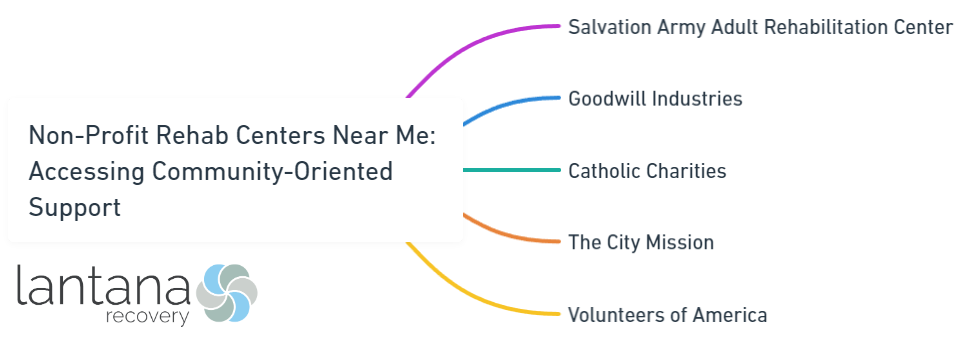Non-profit rehab centers play a vital role in providing community-oriented support and assistance to individuals seeking rehabilitation from substance abuse and addiction. These organizations have a distinct mission and purpose that sets them apart from for-profit rehab centers. By understanding what non-profit rehab centers offer and the benefits they provide, individuals can make informed decisions about accessing the support they need.
Finding non-profit rehab centers near one’s location and considering the types of support offered, as well as the financial considerations involved, are essential factors to be aware of. In this article, we will delve into the world of non-profit rehab centers, highlighting their mission, services, community support, accessibility, and financial considerations. By exploring these topics, individuals can gain insight into the valuable resources provided by non-profit rehab centers and make informed choices about their own recovery journeys.

Understanding Non-Profit Rehab Centers
Non-profit rehab centers are dedicated to helping individuals struggling with addiction or substance abuse, prioritizing their recovery over financial gain. It is essential for individuals seeking assistance or resources for their loved ones to comprehend the nature of non-profit rehab centers. Here are some vital details about non-profit rehab centers:
-
Accessibility: Non-profit rehab centers aim to provide affordable or even free services, ensuring that anyone in need can access their assistance. They rely on government funding, donations, and community support in order to offer their programs.
-
Holistic Approach: In non-profit rehab centers, the focus is not only on addressing addiction but also on addressing underlying issues and mental health concerns that contribute to substance abuse. These centers offer counseling, therapy, support groups, and vocational training as part of a comprehensive treatment plan.
-
Supportive Community: Non-profit rehab centers foster a sense of community among individuals facing similar challenges. This sense of belonging and understanding can significantly enhance long-term success during the recovery process.
-
Flexibility and Individualized Care: Non-profit rehab centers understand that each person’s journey to recovery is unique. Therefore, they tailor treatment plans to meet individual needs, providing comprehensive care for specific challenges and circumstances.
Pro-tip: When considering a non-profit rehab center, it is crucial to research its approach, success rates, and available resources. Involving healthcare professionals, like those at Lantana Recovery, or addiction specialists in the decision-making process can ensure the best care possible. Remember, non-profit rehab centers can provide the necessary support for a healthier, addiction-free life.
What is the Mission of Non-Profit Rehab Centers?
The mission of non-profit rehab centers is to provide accessible and comprehensive treatment for addiction and mental health issues. These facilities prioritize clients’ well-being and recovery above profit. The primary focus is helping individuals overcome substance abuse and achieve long-term sobriety.
Non-profit rehab centers offer evidence-based treatment programs and therapies tailored to client’s specific needs. These programs include detoxification, counseling, family therapy, and aftercare support. The goal is to provide holistic treatment that addresses the physical, psychological, and emotional aspects of addiction recovery.
Additionally, non-profit rehab centers strive to make services affordable and accessible to all individuals. They offer financial assistance programs, and sliding-scale fees, and accept insurance to remove financial barriers.
True Story: Emily, a young woman battling alcohol addiction, found hope and healing at a non-profit rehab center. The facility provided a safe and supportive environment where she received personalized treatment and therapy. The staff helped Emily develop coping skills, understand the root causes of her addiction, and cultivate a strong support network. With their guidance and determination, Emily successfully completed the program and has been living a sober life for over two years. The mission of the non-profit rehab center not only saved Emily’s life but also inspired her to pursue a career in addiction counseling, allowing her to help others in need.
How Do Non-Profit Rehab Centers Differ from For-Profit Centers?
Non-profit rehab centers differ from for-profit centers in several key ways.
- They rely on donations, grants, and government funding for support, prioritizing quality care over profits. In contrast, for-profit centers prioritize financial gain and may prioritize profits over client well-being.
- Non-profit centers often have a mission to serve the community and address social issues related to addiction and mental health. They focus on providing accessible and affordable treatment options. For-profit centers prioritize business growth and shareholder returns.
- Non-profit centers offer a wide range of services, including counseling, therapy, support groups, vocational training, and aftercare support. For-profit centers may offer similar services but may prioritize revenue generation and lack comprehensive care.
- Non-profit centers strive to provide services at affordable or sliding-scale fees, making treatment accessible. For-profit centers have higher costs due to their profit-oriented approach, making them less affordable.
- Non-profit centers prioritize community well-being and collaborate with local organizations and healthcare providers. For-profit centers may operate independently and lack community involvement.
When choosing between a non-profit and another one of the top rehab centers nearby, individuals should consider their financial situation, treatment needs, and personal values. Research and gathering information about the facilities can help make an informed decision that aligns with recovery goals.

The Benefits of Non-Profit Rehab Centers
Non-profit rehab centers offer benefits to individuals seeking addiction treatment:
1. Affordability: Non-profit rehab centers often provide services at a lower cost compared to for-profit facilities. This affordability allows more people to access needed treatment without incurring a significant financial burden.
2. Community-oriented support: Non-profit rehab centers prioritize creating a supportive and inclusive community for individuals in recovery. They have staff members who are passionate about helping individuals overcome addiction. These centers offer a safe and understanding environment where individuals can connect with peers and build a strong support system.
3. Holistic approach: Non-profit rehab centers take a holistic approach to treatment, addressing the addiction and underlying causes, including mental health issues. They provide a range of services, including counseling, therapy, educational programs, and aftercare support, for comprehensive care and long-term recovery.
4. Quality care: Despite being non-profit, these rehab centers provide high-quality care. They have licensed and experienced medical professionals and therapists who specialize in addiction treatment. Additionally, non-profit centers collaborate with local healthcare providers and community organizations, enhancing the quality and breadth of services available.
5. Focus on long-term recovery: Non-profit rehab centers prioritize the long-term success and well-being of their patients. They offer ongoing support and resources to help individuals maintain sobriety after completing treatment. This may include relapse prevention programs, support groups, vocational training, and assistance in reintegrating into society.
What Services Do Non-Profit Rehab Centers Provide?
Non-profit rehab centers provide a range of services to support individuals in their recovery from substance abuse or addiction. These centers offer counseling and therapy sessions, both individually and in groups, conducted by trained professionals. These sessions aim to help individuals understand the root causes of their addiction, develop strategies to cope with their struggles and gain insight into their patterns of behavior.
Additionally, non-profit rehab centers facilitate support groups where individuals can join others who are facing similar challenges. These groups provide a safe and supportive environment for individuals to share their experiences, seek guidance, and offer mutual support to one another.
Education and vocational training programs are also provided by these rehab centers. These programs help individuals acquire essential life skills, improving their chances of successful reintegration into society. Moreover, vocational training equips individuals with employable skills, enhancing their prospects of finding sustainable employment.
Recognizing that recovery is an ongoing process, non-profit rehab centers offer aftercare programs and ongoing support. These programs ensure that individuals have continued access to necessary resources and guidance even after completing the initial rehab program. Ongoing counseling, 12-step meetings, and access to community resources are some of the ways in which individuals are supported during their post-rehab journey.
True Story: Amy sought help at a non-profit rehab center and benefited from individual counseling sessions that helped her address the emotional trauma underlying her addiction. She also found solace in support groups, where she built a strong support system with peers who truly understood her struggles. The center also provided Amy with vocational training, which ultimately helped her secure a job after completing the program. Even after leaving the center, Amy continued to receive aftercare support, attending regular check-in sessions and receiving ongoing guidance. The comprehensive services provided by the non-profit rehab center played a transformative role in Amy’s life, enabling her to maintain sobriety and find hope for the future.
How Do Non-Profit Rehab Centers Support the Community?
Non-profit rehab centers play a vital role in supporting the community through various means. They offer affordable and high-quality treatment services to individuals grappling with addiction, prioritizing the well-being of the community. These centers provide specialized programs, valuable resources, and support, enabling individuals to regain control of their lives and recover successfully.
- In addition to treatment services, non-profit rehab centers create an environment that fosters support and a sense of community. They offer counseling and therapy sessions, where trained professionals assist individuals in openly expressing their struggles and receiving guidance. This nurtures camaraderie and a feeling of understanding throughout the recovery journey.
- Organized support groups are another essential aspect of non-profit rehab centers, bringing together individuals who have similar experiences. These groups serve as a platform for them to provide mutual support and encouragement, strengthening their sense of belonging and aiding in their recovery process.
- Many non-profit rehab centers provide educational programs and vocational training. Equipping individuals with the necessary skills and knowledge helps them reintegrate into society and enhances their chances of finding employment, contributing to their long-term success in recovery.
Non-profit rehab centers recognize that recovery is an ongoing process. They provide aftercare programs and continued support even after individuals complete their initial treatment. This includes ongoing counseling, participation in support groups, and assistance in finding housing and employment, ensuring individuals’ sustained progress toward a healthier and more fulfilling life.

Accessing Non-Profit Rehab Centers Near Me
Looking for community-oriented support at non-profit rehab centers near you? This section dives into how you can access these invaluable resources. Discover effective strategies for locating non-profit rehab centers in your area, and gain insights into important factors to consider when making your choice. Get ready to take a step towards recovery with the assistance of non-profit rehab centers that prioritize your well-being.
How to Find Non-Profit Rehab Centers in Your Area
When searching for non-profit rehab centers in your area, it is important to follow these steps on how to find them:
- Start by conducting a simple internet search using the keywords “non-profit rehab centers near me.” This will generate a list of options to consider.
- In addition to an online search, review local directories such as phone books or online directories that specifically list rehabilitation centers. These directories often have filters or categories to help you search for non-profit organizations.
- Seek referrals from healthcare professionals, social workers, or support groups in your area. They may have firsthand knowledge or can connect you with someone who can guide you to the right resources.
- Contact helplines that specialize in providing information and support for individuals seeking addiction or mental health treatment. They can provide you with a list of non-profit rehab centers in your area and help you find the best fit for your needs.
- Don’t forget to inquire with local community centers, churches, or other community organizations. They may have information about non-profit rehab centers in your area or can point you in the right direction.
When selecting a non-profit rehab center, it is essential to consider factors such as location, treatment approaches, available services, and cost. Finding a center that aligns with your needs and recovery goals is crucial.
What to Consider When Choosing a Non-Profit Rehab Center
When considering a non-profit rehab center, there are several key factors to keep in mind. First and foremost, it’s important to examine the treatment approach utilized by the center.
- Look for evidence-based practices and therapies that have been proven effective in treating addiction whether you’re in a weekend rehab center or inpatient facility.
- Accreditation and licensing are also crucial considerations. Ensure that the center has been accredited and licensed by relevant organizations to guarantee quality and safety.
- Another important aspect to consider is the qualifications of the staff. Look for a rehab center that employs highly qualified and experienced professionals who specialize in addiction treatment.
- Individualized treatment plans are also essential. Seek a center that offers personalized care and a range of therapeutic interventions to address your specific needs.
- Continuity of care is another vital factor. Find a center that provides ongoing support and aftercare services to ensure long-term success in your recovery journey.
- Cost and insurance coverage should be taken into account. Explore your options and select a center that aligns with your financial situation and insurance coverage.
By carefully considering these factors, you can make an informed decision when choosing a non-profit rehab center. This will maximize your chances of successful recovery and provide you with the support you need.

Types of Support Offered by Non-Profit Rehab Centers
Discover the incredible range of support available at non-profit rehab centers near you! From counseling and therapy services to support groups, education and vocational training, and ongoing aftercare, these centers offer a comprehensive approach to recovery. Whether you are in need of personalized guidance, the power of a strong community, or the tools to rebuild your life, non-profit rehab centers have you covered. So, let’s explore the various types of support they provide and how they can empower you on your journey to healing and transformation.
Counseling and Therapy Services
Counseling and therapy services are crucial when it comes to recovery from addiction and mental health issues, and non-profit rehab centers provide these vital support services. These services aim to address the underlying causes of addiction and assist individuals in developing healthier coping mechanisms and strategies for long-term recovery. Non-profit rehab centers offer various types of counseling and therapy:
- Individual Counseling: Qualified therapists at these rehab centers provide one-on-one counseling sessions. These sessions allow individuals to openly discuss their struggles, explore emotional issues, and create personalized treatment plans.
- Group Therapy: These rehab centers also facilitate group sessions, which provide a supportive environment for individuals facing similar challenges to connect. Through shared experiences, peer support is fostered, and individuals can develop their communication and interpersonal skills.
- Family Therapy: Involving loved ones in the recovery process is vital, and non-profit rehab centers achieve this through family therapy sessions. These sessions aim to repair relationships, educate family members about addiction and mental health, and improve overall family dynamics and support systems.
- Specialized Therapy Approaches: Depending on individual needs, non-profit rehab centers may offer specialized therapy approaches like cognitive-behavioral therapy (CBT), dialectical behavior therapy (DBT), or trauma-focused therapy. “Cognitive behavioral therapy (CBT) for substance use disorders has demonstrated efficacy as both a monotherapy and as part of combination treatment strategies” (CBT for SUDs, McHugh et al., 2011.) These approaches address specific issues and help individuals cultivate healthier thoughts, emotions, and behaviors.
- Continuing Care and Aftercare: Non-profit rehab centers understand the significance of ongoing support. Therefore, they provide aftercare services such as relapse prevention planning, alumni programs, and community resource referrals to ensure long-term recovery.
It has been proven through studies that counseling and therapy services offered by non-profit rehab centers have a significant impact on long-term recovery outcomes. Active participation in therapy sessions leads to higher rates of sustained sobriety and improved overall well-being. Hence, these services are highly beneficial for individuals seeking recovery.
Support Groups and Peer Support
Support groups and peer support are crucial in the recovery process for individuals at non-profit rehab centers. These programs create a community, understanding, and encouragement for people facing similar challenges.
- Connection and empathy: Support groups, including support groups, provide a safe space for individuals to share their experiences, fears, and successes without judgment. The connection and empathy received from others who have gone through similar struggles can be very comforting and validating.
- Mutual learning and growth: By participating in support groups and engaging in peer support, individuals can learn from others’ experiences and insights. Different perspectives and coping strategies shared in the group can expand knowledge and help develop healthier ways of dealing with addiction or mental health issues.
- Peer accountability: Being part of a support group and receiving peer support fosters accountability. By openly discussing challenges and setting goals within the group, individuals can find support and motivation to stay focused on their recovery journey. Peer accountability helps reinforce positive behavior and reduce the risk of relapse.
- Building a supportive network: Support groups and peer support not only provide emotional support but also help form strong networks of people who genuinely care about each other’s well-being. These networks are invaluable during challenging times, even after formal treatment ends.
- Holistic well-being: Support groups and peer support address various aspects of well-being, including physical, emotional, and spiritual dimensions. They aim to boost resilience, self-esteem, and coping skills.
Support groups and peer support have a vital role in non-profit rehab centers, complementing counseling and therapy services. They offer an opportunity for individuals to connect and grow with others on the path to recovery.
Education and Vocational Training
Education and vocational training play a pivotal role in non-profit rehab centers. These centers are dedicated to equipping individuals with the necessary skills and knowledge for long-term recovery and successful integration back into society.
- One of the key aspects of non-profit rehab centers is skills development. These centers offer a range of educational and vocational programs, including computer skills, job readiness, financial literacy, and communication courses.
- Non-profit rehab centers collaborate with local businesses and organizations to provide job placement assistance. They assist individuals with resume writing, interview preparation, and job search strategies, aiming to increase employment opportunities for them.
- Non-profit rehab centers offer on-the-job training to help individuals gain practical experience. This training not only enhances their vocational skills but also boosts their confidence in the workforce.
- Non-profit rehab centers also prioritize continued education. They encourage individuals to pursue lifelong learning and provide resources and guidance for scholarships, grants, and enrollment in vocational schools or colleges.
- Furthermore, these rehab centers foster entrepreneurship by providing support and guidance to those interested in starting their own businesses. They offer assistance in business planning, marketing strategies, and financial management.
With comprehensive education and vocational training programs, individuals in non-profit rehab centers are empowered to acquire new skills, enhance their job prospects, and ultimately achieve independence and stability in their lives.
Aftercare and Ongoing Support
Aftercare and ongoing support play a vital role in non-profit rehab centers. These centers offer continued assistance to individuals as they transition from treatment to independent living. The facilities provide various services to ensure individuals maintain their recovery and address underlying issues.
- Counseling and therapy services are readily available at non-profit rehab centers. These sessions assist individuals in developing coping strategies and addressing the root causes of their addiction. The centers offer individual therapy, group therapy, and family therapy to cater to diverse needs.
- Support groups and peer support are crucial components of aftercare. Organizations like Alcoholics Anonymous (AA) and Narcotics Anonymous (NA) provide a safe and supportive environment for individuals to share their experiences. These groups offer guidance and ensure individuals stay connected to others who understand their journey.
- Non-profit rehab centers also offer educational and vocational training opportunities. These programs help individuals rebuild their lives and reintegrate into society after addiction. Services may include job training, resume-building workshops, GED programs, and assistance with enrolling in higher education.
- To ensure individuals have the necessary tools and support to maintain sobriety, non-profit rehab centers develop personalized aftercare plans. These plans include referrals to therapy, support groups, and other community resources.
Active participation and engagement are essential in making the most of aftercare and ongoing support. Attending counseling sessions, regularly participating in support group meetings, pursuing educational or vocational opportunities, and following the guidance provided in the aftercare plan are crucial steps in the recovery journey. Recovery is a lifelong process, and aftercare and ongoing support are crucial in promoting long-term sobriety and leading a fulfilling life free from addiction.

Financial Considerations for Non-Profit Rehab Centers
When selecting a non-profit rehab center, it is crucial to consider the financial aspects. Here are some key factors to keep in mind:
1. Insurance coverage: Check if the non-profit rehab center accepts your insurance plan. This will help determine your out-of-pocket costs.
2. Sliding scale fees: Non-profit rehab centers often adjust the cost of treatment based on income. This makes it more affordable for individuals with lower incomes.
3. Scholarships and grants: Some non-profit rehab centers offer financial assistance to individuals who demonstrate financial need. These options can help reduce the treatment cost.
4. Payment plans: Inquire about the availability of payment plans. Non-profit rehab centers may be willing to create a manageable payment schedule that fits your budget.
5. Additional financial assistance: Research if there are government programs or local organizations that provide financial support for rehab treatment. These resources can help cover the costs.
Contact the non-profit rehab center directly to discuss your financial situation and explore the available options. Remember, the cost of treatment should not hinder you from seeking the help you need.
Are Non-Profit Rehab Centers Affordable?
Non-profit rehab centers have gained recognition as affordable options for individuals seeking addiction treatment. These centers prioritize providing high-quality care without placing a heavy financial burden on patients, unlike for-profit rehab centers.
One of the ways non-profit rehab centers strive to make treatment more accessible is by offering sliding-scale fees based on income. This feature ensures that individuals with limited resources can afford the necessary treatment. Moreover, some centers go a step further by providing financial assistance programs to help cover treatment costs.
The financial sustainability of non-profit rehab centers heavily relies on government grants, generous donations, and community support. By not solely focusing on making profits, these centers can offer their services at a lower cost. This approach allows individuals to prioritize their well-being and recovery without straining their finances.
It is important to note that the affordability of non-profit rehab centers may vary depending on the specific center and the range of services they offer. To find the non-profit rehab center that best fits your budget and treatment needs, it is recommended to conduct thorough research and compare different centers in your local area.
Financial Assistance and Insurance Options
Non-profit rehab centers offer financial assistance and insurance options to ensure access to necessary treatment and support. Here are important facts to consider:
1. Financial assistance: Non-profit rehab centers provide assistance programs to make treatment affordable and accessible. These may include sliding-scale fees based on income, scholarships, or grants.
2. Insurance coverage: Non-profit rehab centers work with insurance providers to help individuals utilize their benefits for addiction treatment. They have staff members to verify coverage and arrange payments.
3. Medicaid and Medicare: Non-profit rehab centers accept Medicaid and Medicare, reducing out-of-pocket expenses for eligible individuals.
4. Private insurance: Non-profit rehab centers work with various private insurance companies to ensure treatment for individuals with private insurance. They may have partnerships with specific providers or accept a wide range of plans.
5. Payment plans: Non-profit rehab centers offer flexible payment plans, allowing individuals to pay for treatment over time.
By providing financial assistance programs, accepting insurance coverage, and offering payment plans, non-profit rehab centers ensure access to support on the recovery journey. If seeking addiction treatment, inquire about financial assistance and insurance options at non-profit rehab centers in your area.
Frequently Asked Questions
How can I access community-oriented support for non-profit rehab centers near me?
Non-profit rehab centers near you can be accessed by reaching out to organizations such as The Salvation Army, which operates rehabilitation facilities offering spiritual, emotional, and social support. These centers provide assistance to individuals dealing with various problems, including substance abuse.
Are there any upcoming events related to mental and substance use disorders?
Yes, virtual naloxone trainings are being held statewide to teach people how to recognize and respond to opioid overdose. Additionally, Project COPE: Community Overdose Prevention Education offers more information on how to reverse an opioid overdose. Stay updated with local organizations and resources for information on upcoming events.
Where can I find support for suicide and crisis situations?
If you or someone you know is in distress, you can reach out to the 988 Suicide & Crisis Lifeline. This helpline offers 24-hour, toll-free, and confidential support to individuals in distress and their loved ones. You can call or text 988 to access this resource.4. How can I receive spiritual assistance and care during rehabilitation?
Non-profit rehab centers, like The Salvation Army’s Adult Rehabilitation Centers (ARCs), offer holistic support that includes spiritual counseling and guidance. These programs aim to meet the spiritual well-being of participants, fostering personal relationships with God for hope and relief.
What are the minimum requirements to participate in non-profit rehab programs?
The specific minimum requirements may vary depending on the non-profit rehab center you choose. However, The Salvation Army’s ARCs generally provide assistance to individuals who have lost the ability to cope with their problems. These programs are typically free of charge and do not require insurance.
Are there funding initiatives available to support overdose prevention efforts and non-profit rehab centers?
Yes, funding initiatives exist to support overdose prevention efforts and non-profit rehab centers. Various organizations and government agencies offer financial support to help combat the substance abuse crisis. Stay informed about these initiatives through local resources and government organizations, such as SAMHSA’s National Helpline.








